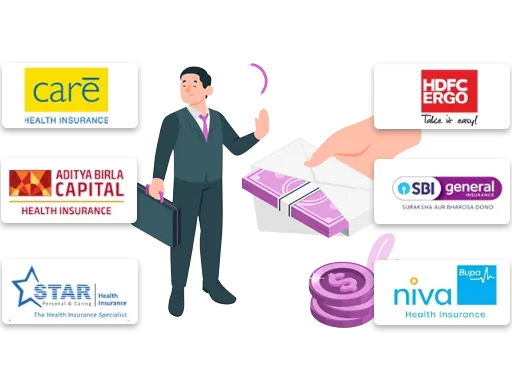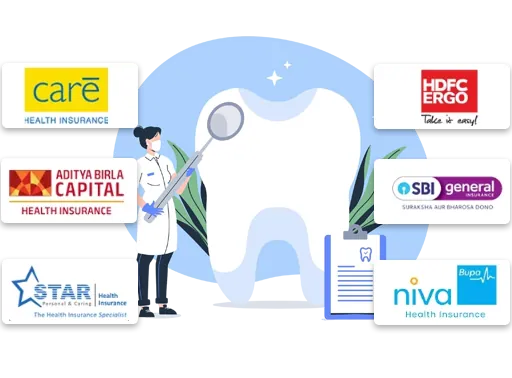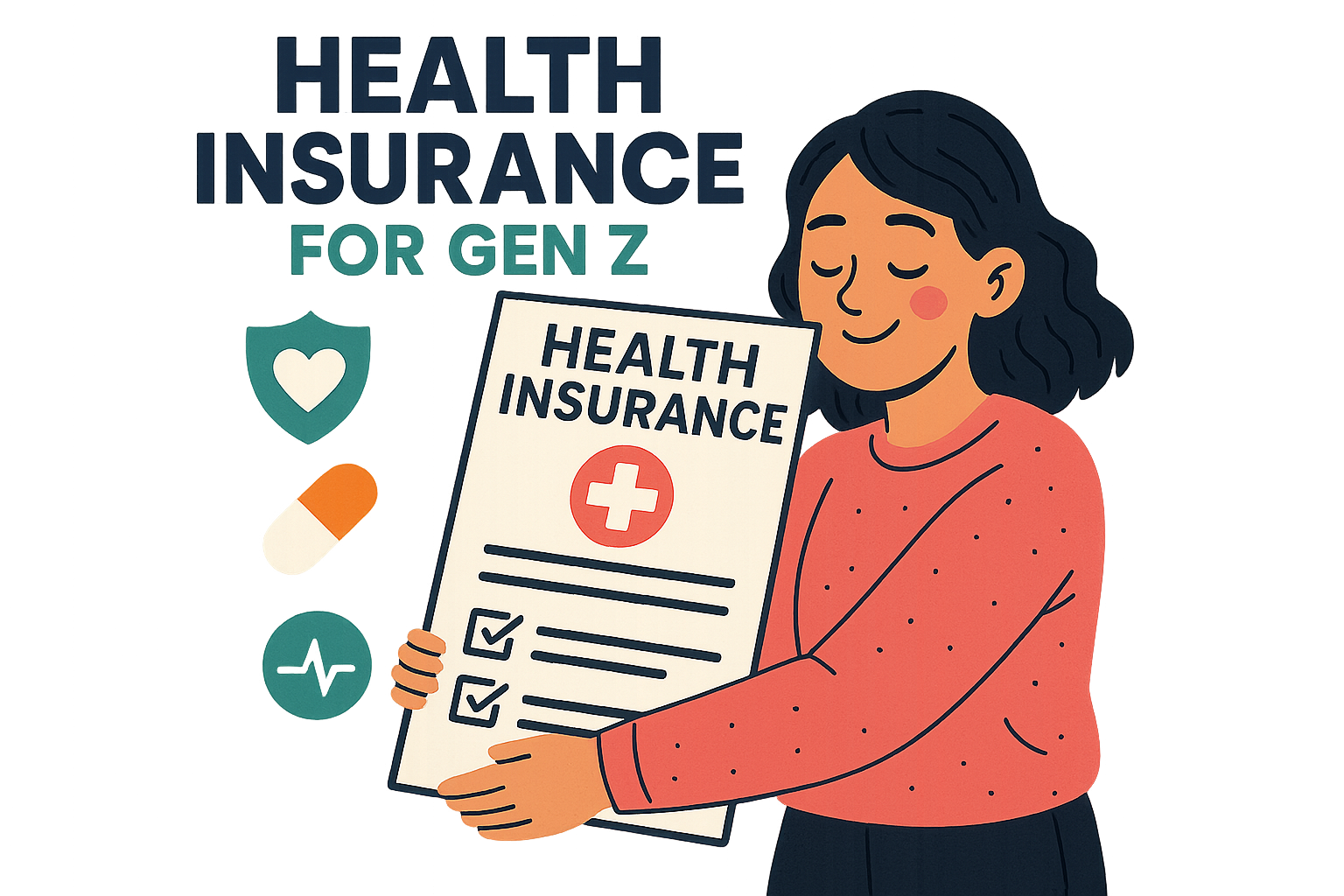GST on Health Insurance




Simran has over 4 years of experience in content marketing, insurance, and healthcare sectors. Her motto is to make health and term insurance simple for our readers has proven to make insurance lingos simple and easy to understand by our readers.
Reviewed By:

Anchita has over 6 years of experience in content marketing, insurance, and healthcare sectors. Her motto to make health and term insurance simple for our readers has proven to make insurance lingos simple and easy to understand by our readers.
Updated on Jul 07, 2025 3 min read
GST on Health Insurance Premium
GST (Goods and Services Tax) on health insurance was implemented by the Government of India in the year 2017. It has removed the previously existing overflowing effects of several taxes. Now, GST is also imposed in the health insurance sector along with on other goods and services, nationally.
The GST on health insurance is 18%. Previously, the rate of service tax on insurance was 15%, which includes:
- 14% Base Service Tax
- 0.5 % Swachh Bharat Cess
- 0.5% Krishi Kalyan Cess
With the evolution of tax systems in India, we have received multiple queries on GST for health insurance. This article covers everything you need to know about GST on health insurance along with the latest GST rates.
What is GST?
GST is a single tax applied at the point of consumption on a variety of goods and services such as transportation, real estate, and insurance. GST is divided into four categories:
- Central GST (CGST): The Central Government receives a part of the GST collected per transaction.
- State GST (SGST): When a transaction takes place within a state, a part of the transaction goes to the state government.
- Integrated GST (IGST): The GST is charged on interstate supplies between two or more states or union territories (UTs), or between one state or UT and a foreign territory.
- Union Territory GST (UGST): The GST is levied by a Union Territory in India for transactions that take place within the Union Territory.
GST Slab Rates
As per the list published by the Central Board of Indirect Taxes and Customs Goods and Services Tax apart from GST on health insurance, there are over 500+ services and 2000 goods that fall under 4 GST slab rates.
Scroll below to get familiar with these categories:
| GST Slab Rates | GST Categories |
| 5% | Household necessities and daily essentials |
| 12% | Processed food, dairy products, cooking utensils, etc. |
| 18% | Health Insurance, cosmetic products, etc. |
| 28% | Luxury items, caffeinated beverages, tobacco, etc. |
Understanding GST on Health Insurance
GST on health insurance is applied during the time of purchase or renewal. This refers to the additional amount levied on health insurance premiums you are liable to pay.
You can easily calculate health premiums including GST using the PolicyX health insurance premium calculator.
All health insurance calculators offer premiums including GST making it easier for you to acquire precise premium rates for your opted health insurance plan. 18% GST on health insurance is applied as per the latest amendments in the Income Tax Laws.
As compared to the previous tax laws, a 3% increase in tax percentage on health insurance has been witnessed on the national level.
Benefits of GST on Health Insurance
The implementation of GST on health insurance premiums has brought out the best in Indian customers.
Structured Taxation System
Replacing the previous taxation system, GST on health insurance offers a structured taxation system. It has simplified the lives of both consumers and health insurance providers.
Clarity regarding the 18% GST rate on health insurance simplifies the regulation of health insurance companies and reduces the risk of any hidden or additional charges.
Ease Of Understanding
Before GST on health insurance, a 15% service tax was levied into the following categories
- 14% Basic Service Tax
- 0.5% Swachh Bharat Cess
- 0.5% Krishi Kalyan Cess
However, since GST for health insurance has been applied an 18% GST is levied on premiums making it easier to understand for consumers.
Encourages Digital Revolution
GST on health insurance successfully revolutionized the insurance sector in India. Integrating technology into premium calculators makes them more efficient in calculating premiums including GST.
This in turn gives customers a peek into how much premium including 18% GST they will be paying, making the buying process easier for customers.
Enhancing Health Insurance Penetration
With a single 18% GST on health insurance, premiums calculation of health insurance has become precise.
With a streamlined tax regime, customers are encouraged to invest in the best individual and family health insurance plans.
Tax Benefits
Customers can avail of tax benefits under section 80D of the Income Tax Act on investing in a health insurance plan. This benefit existed before the GST on health insurance was implemented.
However, with the GST taxation system, there is an improved clarity on the tax benefits making it easier for customers to rely on health insurance.
 traordinary Facts
traordinary Facts
While there have been discussions and proposals regarding changes to the GST on health insurance in India, no concrete changes were implemented in the current budget for 2025. The GST on health insurance premiums in India remains at 18%.
Impact of GST on Health Insurance
GST is applied to all insurance plans including health insurance. As a result, the health insurance premium you pay today will automatically be subjected to the 18% GST.
Insurance premium prices have increased for buyers after the implementation of GST. They will now have to pay an additional amount depending on the current rate, rather than the previous 15% service tax.
The premium you pay for your health plan provides you comprehensive coverage for a variety of medical expenses not limited to mere hospitalization.
GST is applied to health insurance premiums that cover pre and post-hospitalization fees, daycare treatments, diagnostic testing, OPD costs, and maternity care, which are also covered under such plans during the policy period.
GST Rate On Health Insurance
The GST on health insurance premiums is applied to the total amount of the premium. Unlike life insurance, where GST only applies to the risk coverage component of the premium rather than to the investment component which offers maturity benefits.
For instance, suppose you opted for a health insurance policy of coverage amount of INR 5 Lakh and the premium cost is INR 10,000 per year.
Now, let us see the cost impact:
Before GST on health insurance premiums:
The tax applicable was 15%. That is, the premium to be paid would have been:
(15% GST on 10,000) + 10,000 = 11,500 INR
After GST on health insurance premiums:
The current tax applicable is 18%. That is, the premium to be paid is calculated as below:
(18% GST on 10,000) + 10,000 = 11,800 INR
You have to spend 11,800 INR on your medical insurance premium.
Impact Of GST On Tax Deductions
While the imposition of GST on health insurance may have increased from 15% to 18% there is still a silver lining to it all. Customers are eligible for tax benefits under section 80D as per the Income Tax Act.
This allows customers to claim tax deductions paid towards the premiums of health insurance plans which includes the GST on health insurance premiums.
Impact of GST on Renewal of Health Insurance
On your health insurance plan purchase after the introduction of GST, you will have to pay an increased premium.
Individuals who purchased long-term policies before GST for health insurance came into effect will not be affected by the GST. However, the premium they pay at renewal will be calculated based on the new tax regime.
Positive Impacts of GST on Health Insurance Policies
Due to the increase in GST on health insurance, premium rates have risen significantly. The competition between insurers has tightened as a result of this.
Insurers offer health insurance policies at lower and more affordable prices to get more customers to buy their products. They also make the policy-buying and claim-filing processes easier so that better services attract more potential insurance customers. The introduction of GST on health insurance has increased the overall quality of services provided by health insurers.
The Future Outlook
There have been suggestions from various quarters, including the State Bank of India (SBI), to reduce or exempt GST on health insurance premiums. These proposals aim to make health insurance more affordable and accessible, especially for senior citizens and those with lower incomes.The government has acknowledged these concerns but has not yet implemented any changes. One reason for this could be that exempting GST would deny insurance companies the benefit of input tax credit (ITC), which could lead to higher premiums. The government is trying to find a balance between providing relief to policyholders and ensuring the financial viability of insurance companies. However, the GST Council is likely to consider the report of the Group of Ministers (GoM) that reviewed the taxation of health and life insurance premiums. The council may decide on changes to the GST rates in future meetings.
Tax Savings Under Section 80D
Health Insurance provides you and your family with a financial safety net in the event of any medical emergency. It also saves you from draining your life savings for the treatment of any minor or major ailments.
The purchase of health insurance not only provides a financial cushion but also is a source for tax exemptions and saving your hard-earned money. Tax Benefits Under Section 80D, insurance holders are eligible for tax deductions of up to INR 50,000 per fiscal year.
GST on health insurance does not change the way you can avail of the benefits for tax deductions via section 80D of the Income Tax Act.
What is Changed under Union Budget 2025?
The Union Budget presented by Finance Minister Nirmala Sitaraman for FY 2025-26, has introduced new income tax slabs that are as follows:
| Income (INR) | Tax Slabs |
| 0 to 4 Lakhs | Nil |
| 4 to 8 Lakhs | 5% |
| 8 to 12 Lakhs | 10% |
| 12 to 16 Lakhs | 15% |
| 16 to 20 Lakhs | 20% |
| 20 to 24 Lakhs | 25% |
| Above 24 Lakhs | 30% |
Under the new tax regime, individuals earning up to ₹12 lakh annually will not have to pay any income tax. The aim is to reduce the tax burden from the different income sections of society, especially the financially-burdened middle class.
Conclusion
With a significant shift in the tax structure of the insurance sector in India, it is natural to have questions. However, the implementation of GST on health insurance resulted in many benefits for both buyers and sellers.
For further information on GST for health insurance premiums contact insurance experts at PolicyX.
Finally, as we always say, while opting for any health insurance plan one must consider his or her needs and carefully match them with the provision of the plans. Check the policy tenure, claim settlement ratio and other details that will shape the entire insurance plan in the long run, not just the premiums.
To find out how you can benefit from the latest GST tax structure on health insurance connect with our insurance experts now.
Consult for Personalized Insurance Advice

But how does it work?
Schedule a call with India’s number 1 trusted advisor with a 4.5+ rating on Google. We are not your average insurance agents. Our advisors are experts in their insurance knowledge and will give you the right information at the right time. The service is free of cost! Don’t worry, we won’t spam as we value your time.
Health Insurer Network Hospitals
GST on Health Insurance Premium: FAQs
1. What is an HSN code for health insurance?
HSN codes are given to goods and services for easier GST classification. The HSN code for health insurance is 997133.
2. What is GST on health insurance?
GST on health insurance refers to the tax levied on health insurance premiums at 18%. The new tax value was first introduced in the year 2017.
3. How much GST is applied to health insurance?
A single GST of 18% is levied on health insurance premiums.
4. How does GST on insurance premiums work?
GST is a single tax levied on all goods and services like food items, textiles, electronic appliances, service taxes, and others. Currently, GST on medical insurance is at 18%.
5. How many types of GST are there?
GST is a single indirect tax applied at the point of consumption on a variety of goods and services such as transportation, real estate, and insurance. GST is divided into four categories: Central GST (CGST): The Central Government receives a part of the GST collected per transaction. State GST (SGST): When a transaction takes place within a state, a part of the transaction goes to the state government. Integrated GST (IGST): The GST is charged on interstate supplies made between two or more states or union territories (UTs), or between one state or UT and a foreign territory. Union Territory GST (UGST): The GST is levied by a Union Territory in India for transactions that take place within the Union Territory. GST is levied on a variety of goods and services in five different slabs: 0%, 5%, 12%, 18%, and 28%. Medical insurance products are charged at a rate of 18%.
6. Are Goods and Services Tax refundable tax?
The GST tax is non-refundable in the case of health insurance. However, if someone sells products at lower tax rates and pays a higher tax rate the Goods and Services Tax is refundable.
7. Is GST levied on all health insurance policies?
Yes, GST is applicable to health insurance policies. The current GST rate applicable on health insurance policies is 18%
Health Insurance Companies
Know More About Health Insurance Companies
Share your Valuable Feedback
4.4
Rated by 2634 customers
Was the Information Helpful?
Select Your Rating
We would like to hear from you
Let us know about your experience or any feedback that might help us serve you better in future.


Written By: Simran Saxena
Simran has over 4 years of experience in content marketing, insurance, and healthcare sectors. Her motto is to make health and term insurance simple for our readers has proven to make insurance lingos simple and easy to understand by our readers.






















Do you have any thoughts you’d like to share?